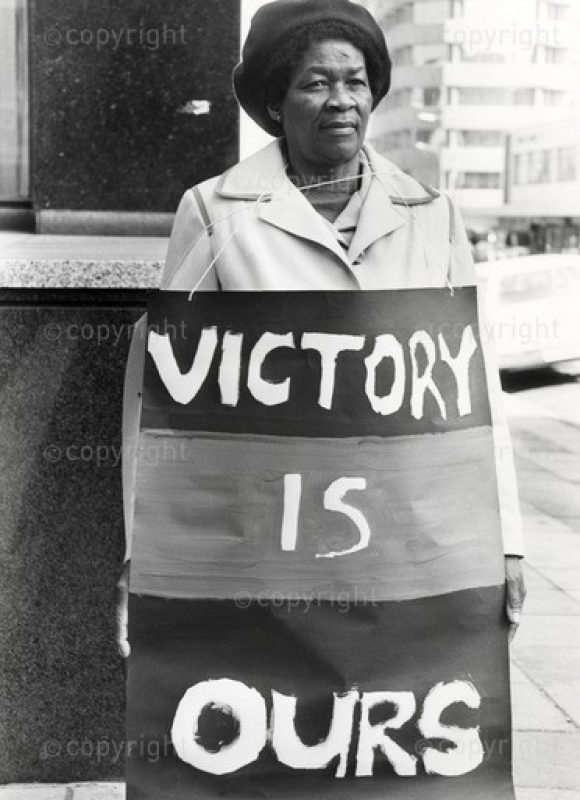PIONEER
Albertina Sisulu (née Nontsikelelo Thethiwe)

Human rights activist | ANC Women’s League member | Politician
Born: 21 October 1918 Died: 2 June 2011
“Women are the people who are going to relieve us from all this oppression and depression. The rent boycott that is happening in Soweto now [in the 1980s] is alive because of the women. It is the women who are on the street committees educating the people to stand up and protect each other.”
Who is
Albertina Sisulu (née Nontsikelelo Thethiwe)?
Began her career as a nurse and became increasingly political, taking on leadership roles within the African National Congress Women’s League (ANCWL) and Federation of South African Women (FEDSAW).
Professions
and Roles
Nurse, political activist and council to her husband, former Secretary-General and Deputy President of the ANC, Walter Sisulu.
Best Known For
Sisulu was widely referred to as the “Mother of the Nation”. She is best known for her activism against the apartheid regime.
Life highlights
- Sisulu and her family went to live with her maternal family in Xolobe as her mother was constantly ill after surviving the Spanish flu.
- Sisulu was forced to leave school on several occasions to take care of her younger siblings because her mother was constantly ill. She fell behind by two academic years, but this did not stop her from winning a four-year high school scholarship at Mariazell College.
- Sisulu moved to Johannesburg in 1940 to pursue a career in nursing at the Johannesburg General hospital.
- Albertina Sisulu met her future husband Walter in 1941 and through him began attending political meetings in a supportive role. She was the only woman present at the inaugural conference of the ANC’s Youth League in 1944.
- Sisulu qualified as a nurse in 1944 and married Walter.
- In 1948 when the ANCWL was formed, Sisulu joined as a member and began her life as an activist.
- In the 1950s, Sisulu assumed leadership roles in the ANC and in FEDSAW. She was one of the organisers of the historic anti-pass women’s march in 1956 and opposed ‘Bantu’ education.
- She was jailed several times for her political activities and constantly harassed by apartheid security.
- When Walter forfeited bail and went underground in 1963, Sisulu and her young son were arrested. She was the first woman to ever be arrested under the General Laws Amendment Act. She was placed in solitary confinement for almost two months while the Security Branch looked for her husband.
- Sisulu was detained and put in solitary confinement again in 1981 and 1985 for her activism. She was also placed under multiple bans and under house arrest.
- In 1983, Sisulu was elected co-President of the United Democratic Front.
- In 1989 Sisulu was part of the United Democratic Front (UDF) delegation that met US President, George Bush, to establish relations between the two countries.
- In 1990 after the ANC was unbanned, Sisulu worked on a committee to re-establish the ANC Women’s League.
- In 1991 Sisulu was elected to serve on the ANC’s National Executive Committee (NEC).
- In 1994 Sisulu became a Member of Parliament (MP).
- In 1999 Sisulu left Parliament and retired from politics.
IN THEIR OWN WORDS
“We as women wouldn’t take this [Bantu education]. We organised other women against the Bantu Education and we closed the schools. We thought of forming an organisation that will put all the women together, so that at least our fight will be easy if we speak with one voice. Now we formed an organisation which was called Federation of South African Women in 1954.
All these years I never had, you know, a comfortable life. Because from 1958 when I was in jail, that was the beginning of my life in and out of jail. Fifty-eight I was in jail, sixty-three I was in jail with my first son who was seventeen years then. We were arrested because of the Suppression of Communism Act, which meant ninety days without trial. So we went to jail with this boy, and when we completed the ninety days we were released, and after that he was harassed by the police.
Really, we have been always optimistic that the end of this country will end up being what the people want it to be. To be a non-racial democratic South Africa. I think we are getting to that. We are working hard for this constituent assembly that is going to draft the constitution of the country. So that is why we say, at least there are those processes that are going on. That is why we are hopeful. That really we are forging ahead.”
– Albertina Sisulu, 1991
IN THE WORDS OF OTHERS
“She became one of the distinguished torchbearers during apartheid. […] She was a voice against injustice and a rock upon which her family and many struggle activists leaned on. […] Mama Sisulu embodied tenacity, fortitude, strength, and became a beacon of hope during the darkest period of apartheid, and she was a phenomenal leader.”
– Moloto Mothapo, ANC member, ceremony marking Albertina Sisulu’s 100th birthday, 2018
“She had remarkable dignity and courage.”
– Archbishop Desmond Tutu, Nobel Peace Prize laureate
– Moloto Mothapo, ANC member, ceremony marking Albertina Sisulu’s 100th birthday, 2018
“She has been a very brave and powerful woman in South African politics. The first time I met her I was from prison, we met her so she could take us through what to expect, she was so motherly. She spoke to us like a politician, but she mostly spoke to us like a mother. She was a very loving person.”
– Bantu Holomisa, Leader of the United Democratic Movement
Sisulu had been banned for 18 years, the longest any person in South Africa had been banned.
